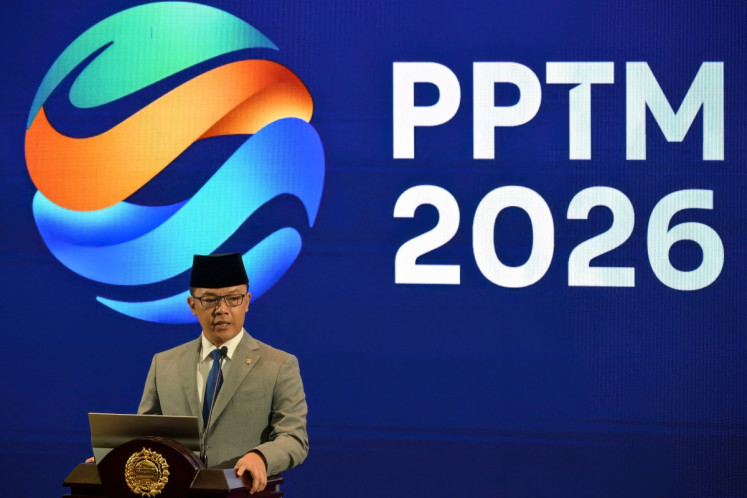Popular Reads
Top Results
Can't find what you're looking for?
View all search resultsPopular Reads
Top Results
Can't find what you're looking for?
View all search resultsLack of engineers puts infrastructure dreams at risk
Jeremy Alverius, a 21-year-old civil engineering graduate from the Bandung Institute of Technology (ITB), is currently waiting for responses from companies he applied to in order to start his first job in engineering
Change text size
Gift Premium Articles
to Anyone
J
eremy Alverius, a 21-year-old civil engineering graduate from the Bandung Institute of Technology (ITB), is currently waiting for responses from companies he applied to in order to start his first job in engineering.
He sent his résumé to eight different companies, but only two out of eight vacancies are in line with his educational background. He has applied for jobs with state-owned construction company PT PP (Persero) and Jakarta-owned PT Mass Rapid Transit Jakarta, which currently leads the development of and will subsequently manage Indonesia’s first mass rapid transit system. The construction of MRT’s first line, set to connect Lebak Bulus in South Jakarta and the Bundaran HI traffic circle in Central Jakarta, is expected to be completed by 2019. The remaining companies he applied to were e-commerce startups or finance companies.
Jeremy admitted the challenge facing most civil engineering students like him. “Most students mention [state-owned construction companies] Wijaya Karya or Adhi Karya when asked where they want to work after graduation. Most of them have no idea what exactly to do after graduation, but that the end goal of studying civil engineering is to work [at a company],” he said.
The ITB Civil Engineering Students Association initiated the ITB Civil Engineering Expo (ICEE) to bridge more than 20 companies — private and state-owned — with students and graduates. “In the classroom, they learn about theories; [at the expo] they can get more practical knowledge like the difference between construction and consultant companies, and so on,” he said.
The challenge that Jeremy described was probably the tip of the iceberg in Indonesia’s engineering sphere. Various studies at the national level show that the country lacks engineers, particularly to keep up with the government’s infrastructure targets.
According to ITB rector Kadarsah Suryadi, Indonesia only has 2,671 engineers per 1 million citizens (pomc). The ratio is far below other Southeast Asian counterparts, such as Malaysia (3,333 engineers pomc), Thailand (4,121 engineers pomc), and Vietnam (9,037 engineers pomc).
The Yogyakarta-based Gadjah Mada University (UGM) predicts that the country may need 280,000 more engineers in the next five years.
Rudianto Handojo, the executive director of Institute of Indonesian Engineers (PII), also noted that less than 15 percent of university graduates in Indonesia were engineering graduates, half of whom hold degrees in computer engineering, who do not acquire practical skills in construction. It is also estimated that only half of all engineering graduates work in line with their educational background.
Rudianto laid out the rather unappealing, long and winding road an engineering graduate must go through to get professional credentials. An engineering graduate should work on linear projects for several years, before he or she returns to school and enrolls in a professional program.
“Just like when a law graduate wants to be a public notary, or a medical school graduate wants to be a doctor,” he said, adding that, thus far, such professional programs are only available in 18 state universities.
To further acquire professional credentials, an engineer also ideally needs to be assessed and certified by an accredited association so that they can lead in projects. In Indonesia, the Persatuan Insinyur Indonesia (PII), which operates under the aegis of the Research, Technology, and Higher Education Ministry, is among the national associations authorized to certify engineers.
“[That’s why] many [engineering graduates] prefer to land jobs which guarantee quick, enticing pay, such as [working as] a banker,” he said.
Surabaya’s 10 November Institute of Technology (ITS) maritime engineering professor Daniel M. Rosyid pointed out another glitch in the current education regime, saying the country’s engineering education prioritized quality over relevance.
“Relevance is much more important [for Indonesia today] — whose problems must engineers solve? If we want them to resolve Indonesia’s problems, then they should learn how to do so,” Daniel said.
Indonesia is currently entering the phase of, as Daniel puts it, “deindustrialization”, in which trade policies overshadow industrial policies, meaning that human security is prioritized over self-sufficiency.
“For economists, for example, the availability of products is important, but it doesn’t matter who [or which countries] made them,” he said, adding: “That’s why our engineers mostly work in multinational companies as operators or supervisors.”
The government is trying to boost the number of engineering graduates, among others, by optimizing government-funded scholarship programs, including the Endowment Fund for Education (LPDP) program.
President Joko “Jokowi” Widodo, who holds a bachelors degree in forestry engineering, has approved a plan to build a new ITB campus on a 350-hectare plot in Walini, West Bandung regency, to expand its engineering studies.










